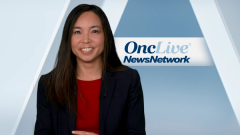
Treatment Options After Induction Chemotherapy Treatment
Catherine E. Lai, MD, MPH, shares her approach to treatment after a patient with AML completes induction therapy.
Episodes in this series

This is a synopsis of an Insights series featuring Catherine E. Lai, MD, MPH, of the University of Pennsylvania.
Dr. Catherine E. Lai discussed the importance of both short-term and long-term planning when treating patients with AML with intensive induction chemotherapy. She noted that while patients are overwhelmed during the initial month-long hospitalization, it is key to also consider their long-term options like transplant eligibility early on. Simple blood tests for HLA typing should be sent for transplant evaluation, which can take 3-4 weeks for results.
After induction, the goal is to achieve complete remission. Without remission, salvage options are considered. But with remission, the team evaluates transplant candidacy versus consolidation chemotherapy. Per ELN 2022 guidelines, patients with adverse risk and most intermediate risk molecular subtypes should proceed to transplant as the only curative option. However, favorable risk patients or those ineligible for transplant due to age/comorbidities continue intensive consolidation chemotherapy, typically cytarabine-based regimens plus molecularly targeted agents depending on mutations. The goal is at least 2 cycles but ideally 4 cycles of consolidation chemotherapy.
For patients receiving only consolidation chemotherapy and not transplant, maintenance therapy is also considered depending on initial risk stratification. Throughout, Dr. Lai emphasized the importance of frequent conversations with patients to set expectations, explain treatment rationale including molecular testing results, and outline short-term hospitalization plans as well as longer-term post-remission approaches. Clear communication facilitates optimal patient understanding and shared decision making when navigating the various intensive AML treatment options.
*Video synopsis is AI-generated and reviewed by OncLive editorial staff.







































